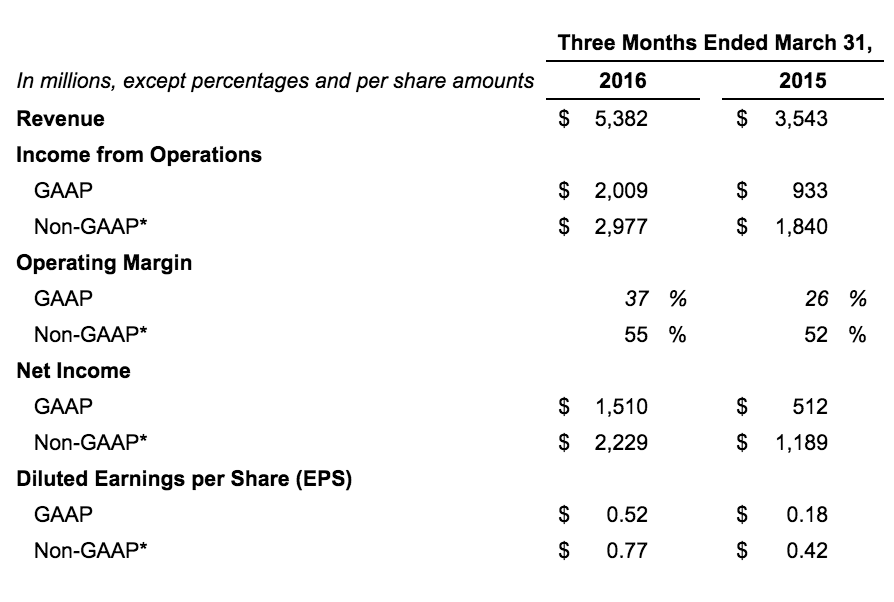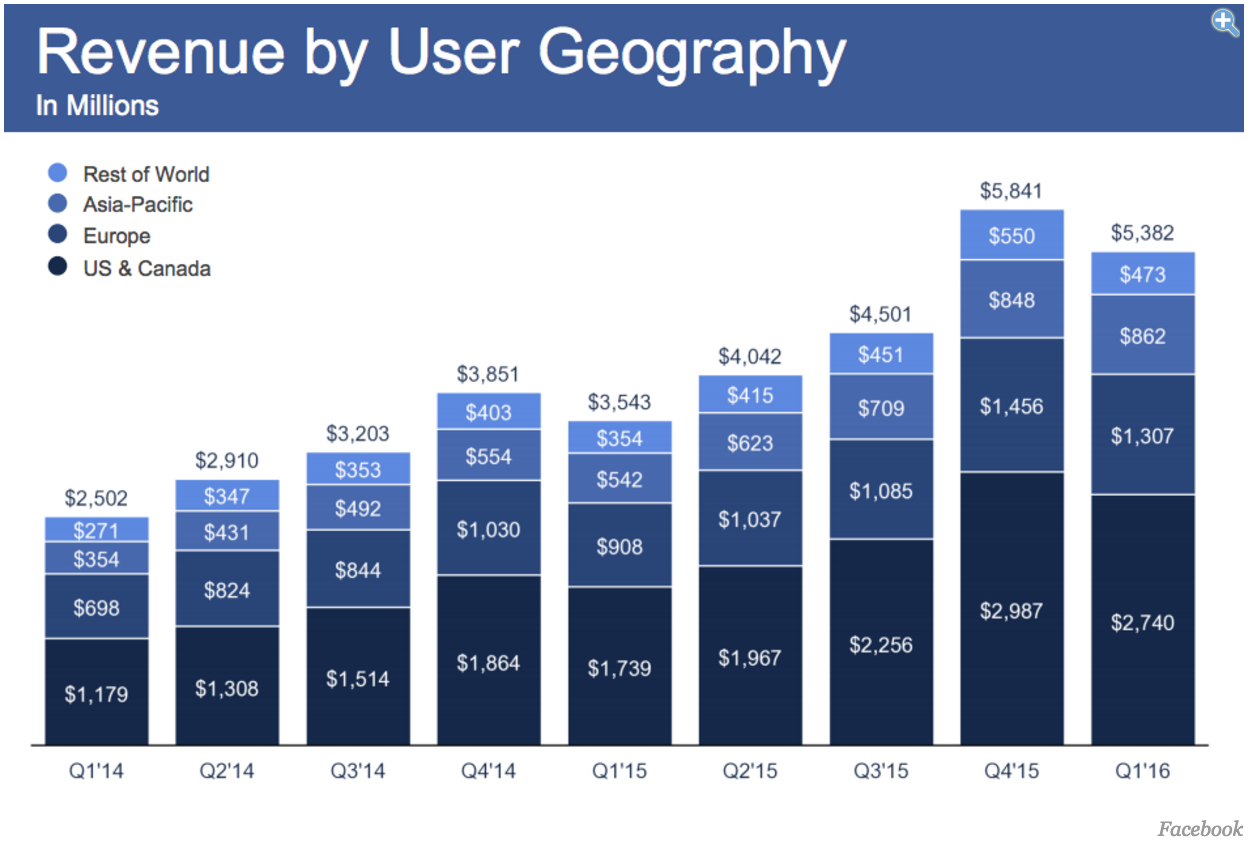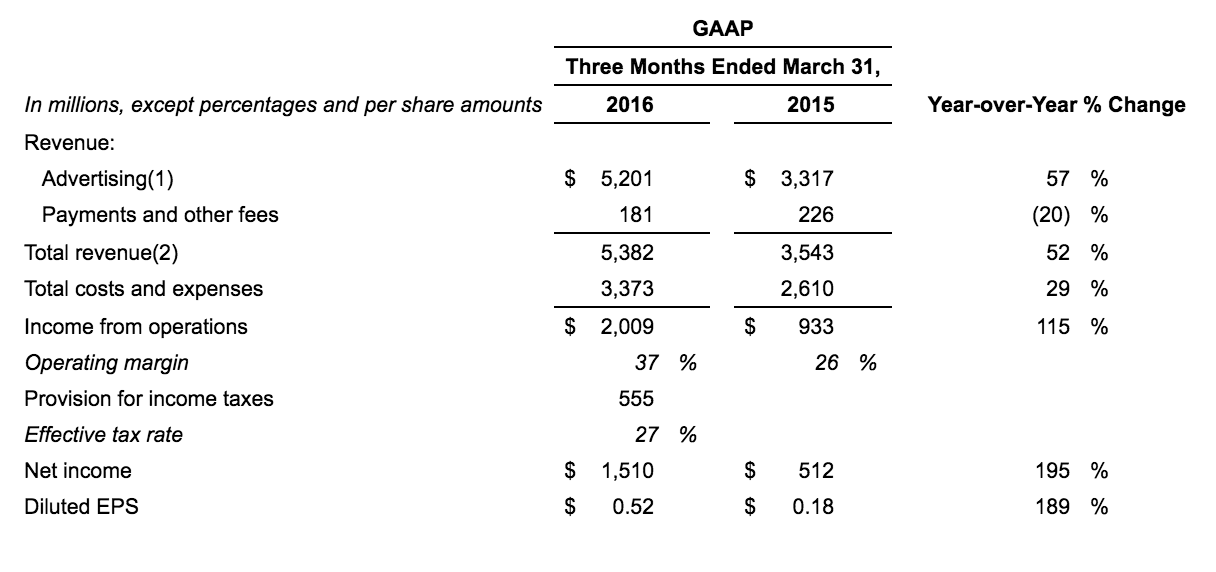Facebook Triumphs Over Expectations
by Rebecca Muir on 28th Apr 2016 in News


Yesterday (27 April) Facebook, Inc. (NASDAQ: FB) reported financial results for the quarter ended March 31, 2016. The company's results dwarfed analysts' expectations, resulting in a 9% increase in stock in after-hours trading.
Facebook's triumphant earnings are refreshing after a week of poor results from Netflix, Twitter, Apple, and Alphabet (Google). "We had a great start to the year", said Mark Zuckerberg, Facebook founder and CEO. "We're focused on our 10-year roadmap to give everyone in the world the power to share anything they want with anyone."
Posting USD$5.38bn (£3.66bn) versus analyst expectations of USD$5.25bn (£3.57bn); Facebook's earnings per share (EPS) were USD$0.77 (£0.52), 24% above expectations of USD$0.62 (£0.42) per share.
Most importantly for the company's future, monthly active users now stands at 1.65 billion; expectations were at 1.62 billion.
With 1.65 billion people using Facebook every month, it's no wonder advertising revenue is up 57%.
Taking a closer inspection of the numbers reveals just how well Facebook are monetising its users: daily active users (DAUs) were 1.09 billion on average for March 2016, an increase of 16% year-on-year; but revenue from advertising is up by more then 3.5 times DAUs.
Mobile DAUs were 989 million on average for March 2016, an increase of 24% year-on-year, still not close to that 57% increase in revenue.
Therefore, we must conclude that the revenue per ad has increased significantly over the past year, the question is: how?
Justin Taylor, UK MD at Teads offers one possible explanation: video ads. He said: "We’re seeing brands prioritise ‘in-feed’ video advertising, which is less interruptive than traditional pre-roll formats offered by the likes of YouTube. Facebook has made the most of this and it’s clearly paid off. Facebook’s earnings underline just how central video has become the digital strategies of most advertisers.
"However, if the company is to maintain its position as the dominant social media platform, it must fiercely protect the user experience. One way to do this is to make video advertising ‘native’ – meaning it complements the surrounding page content or editorial. For example, a user reading about football will be served a relevant football-related product ad.
"For Facebook, this is challenging as it has very little editorial control over the user-generated content that appears on its site. This is where premium publishers, such as online newspapers and magazines, can gain the upper hand in the race for advertisers. They can offer advertisers a premium, safe environment for native video ads that are engaging because of – not in spite of – the content that surrounds them. Expect the juggernaut that is Facebook to continue to attract video advertising dollars in the coming months, but expect premium publishers to also win their fair share of the growing pie.”
Whether Facebook can replace others, such as Twitter and Snapchat, as the go-to place for real-time reaction and content remains to be seen.
First Quarter Financial Summary

Source: Facebook
Here's a look at where Facebook's revenue comes from across the globe:

First Quarter 2016 Operational Highlights
– Daily active users (DAUs) - DAUs were 1.09 billion on average for March 2016, an increase of 16% year-on-year
– Mobile DAUs - Mobile DAUs were 989 million on average for March 2016, an increase of 24% year-on-year
– Monthly active users (MAUs) - MAUs were 1.65 billion as of March 31, 2016, an increase of 15% year-on-year
– Mobile MAUs - Mobile MAUs were 1.51 billion as of March 31, 2016, an increase of 21% year-on-year.
First Quarter 2016 Financial Highlights

Source: Facebook
Mobile advertising revenue represented approximately 82% of advertising revenue for the first quarter of 2016, up from 73% of advertising revenue in the first quarter of 2015.
Facebook did not separate revenue from Instagram, nor did it comment on how it will monetise WhatsApp. What Facebook has said is that Facebook Messenger and WhatsApp, combined, see three-times as many messages sent per day than the global volume of SMS text messages. Therefore, monetisation should come relatively easily.
We also know that the company is working on a vast array of apps and services, and with 1.65 billion users, it will not be short of testers to provide feedback which will allow Facebook to quickly iron out any frustrations.
As reported on Yahoo Finance Facebook have announced: Corporate chat-bots inside the Facebook Messenger app to offer goods and services and respond to questions in a human way; it has built its own VR camera, the Surround 360. They announced a new open API for developers to plug in to Facebook Live. They will open up its Instant Articles platform to all publishers. It announced a new digital rights system to protect user-uploaded videos. Other developments such as pushing live video like never before, offering the Live video tool to every user and moving the Live tab right to the centre of its mobile app, and a new standalone, Snapchat-like camera app have also been announced.
DisplayEarningsSocial MediaVideo








Follow ExchangeWire